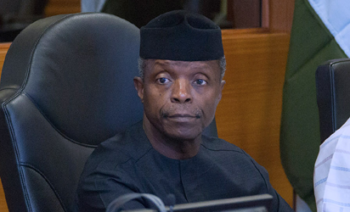
Voluntary tax payers who defaulted in exercising this obligation would be granted amnesty by way of full immunity from prosecution for evading tax, Acting President Yemi Osinbajo has said.
Osinbajo, who disclosed this on Thursday at the formal launch of the Voluntary Assets and Income Declaration Scheme (VAIDS) in Abuja, said he would immediately sign an executive order (Thursday) to approve the new tax policy.
VAIDS is a time-limited opportunity by the government for taxpayers to regularize their tax status relating to previous tax periods. The Scheme would last for one year, from July 1, 2017 to March 31, 2018.
In exchange for fully and honestly declaring previously undisclosed assets and income, the acting president said some of the benefits of the policy include amnesty to tax payers for overdue interest and penalties, and assurance that they would not face criminal prosecution for tax offences or be subject to tax investigations.
Lamenting the country’s poor tax to gross domestic product, GDP of six percent, the acting president, who described it as the lowest in Africa, said Nigeria’s tax system should follow the global best practice, by ensuring that those with the highest income levels shouldered the greatest tax burden.
Noting the progress by government in taxing those in formal employment, he said self-employed persons, professionals and some companies evade full tax payment due to the inability of the tax authorities to assess their true income and assess them accurately.
“The Joint Tax Board, JTB, as at May 2017 disclosed that the total number of tax payers in Nigeria is just 14 million out of an estimated 69.9 million who are economically active,” he said.
Out of this number, he said 90 per cent have their taxes deducted under the pay-as-you-earn, PAYE system (particularly government workers), while four per cent were tax compliant under direct assessment system, with the vast majority of others not paying taxes at all.
He said available data showed that only 20 per cent of the total economically active population of 186 million Nigerian pay tax, with only 214 Nigerians paying taxes of N20 million and above, while another group of over 914 other pay taxes of about N10 million and above.
Except two in the last category of tax payers, who come from Ogun State, he said all others were from Lagos State.
He said some of persons involved in tax evasion adopt several methods to beat the tax system, including the manipulation of accounting records by keeping two sets of books, one for poor income and heavy expenditure for tax purposes, and the other with healthy income balances for internal accounting purposes.
Many states, he said, lacked the machinery to accurately track the true income of their residents. He pointes out that tax evaders either use complex structures in transactions, or refuses to register for value added tax, VAT, or charging VAT without remitting to the Federal Inland Revenue service, FIRS as well as refusal to pay Capital Gains Tax (CGT) on asset disposals.
As part of the government policy to create awareness about tax issues, the acting president declared “Tax Thursday,” across the country to ensure that Nigerians from all the 36 states of the federation and the Federal Capital Territory, FCT, Abuja, were sensitized and educated on the need to perform their civic responsibility.
At the launching, the 7,500 Community Tax Liaison Officers recruited recently by the government were unveiled to the public, charged with the responsibility of working at the grassroots across all the states of the federation to educate Nigerians on their responsibility to pay.
The Minister of Finance, Kemi Adeosun, said with declining oil revenues in recent times, it became incumbent on government to diversify the country’s revenue base, through adequate mobilization for Nigerians to pay tax.
Mrs. Adeosun said tax compliance has been so poor as a result of poor tax payers education on their roles and the recognition of the role of tax in national development.
She said these two problems has resulted in huge amounts of money that should have been taxed have left the country, leaving the government with no funding for critical projects to improve the quality of lives of the people, including roads, hospitals, schools and other social amenities.
The chairman, Senate Committee on Finance and Appropriation, John Enoh, who represented the Senate President, Bukola Saraki, described the tax initiative as commendable, assuring that the legislature would do all within its power to support it to succeed, to make money available to government for the execution of projects and programmes for the people.
The chairman, FIRS, Tunde Fowler, said payment of tax was not only a collective responsibility of all Nigerians, to ensure money was made available for government to execute its programmes on behalf of the people, but also a source of empowerment for the people to hold government accountable.
“If one pays tax, one would be bold to demand for services whenever such services are lacking in their area,” he said.